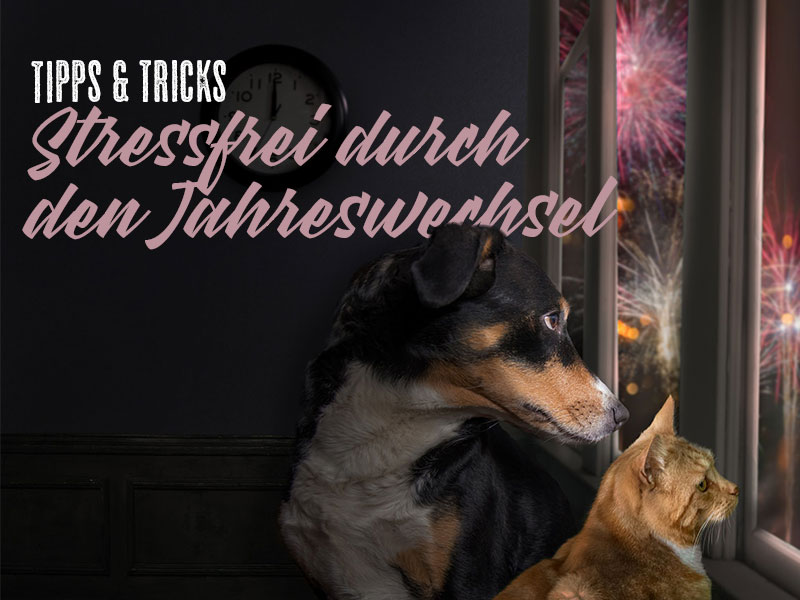Wie erkenne ich, ob mein Tier gestresst ist?
Hunde und Katzen hören um ein Vielfaches besser als wir Menschen, deshalb nehmen sie das Laute Knallen der Feuerwerkskörper anders und viel lauter war als wir. Zwar reagieren nicht alle Fellnasen auf das laute Knallen und die grellen Blitze am Himmel, dennoch sind ein Großteil der Haustiere in der Silvesternacht gestresst. Wir haben dir zusammengefasst, auf welche Anzeichen du bei deiner Katze oder deinem Hund achten solltest:
Anzeichen für Angst bei Hunden
- Starkes Hecheln und vermehrtes Gähnen
- Starkes Zittern am ganzen Körper
- Angelegte Ohren
- Geweitete Pulippen und aufgerissene Augen
- Geduckte, kauernde Haltung, eingeklemmte Rute
- Langgezogene Mundwinkel
- Appetitlosigkeit und Unruhe
- Durchfall und/oder vermehrter Speichelfluss
Anzeichen für Angst bei Katzen
- Exzessives lecken und putzen
- Plötzliche Unsauberkeit
- Angelegte Ohren
- Geweitete Pulippen und aufgerissene Augen
- Zielloses Umherstreifen
- Weglaufen und verstecken
- Appetitlosigkeit
Unsere tipps gegen stress an silvester
1. verhalte dich wie immer
Je normaler du den Alltag an Silvester gestaltest, desto einfacher fällt es deinem Hund oder deiner Katze, sich zu entspannen, denn die Routine beruhigt deinen Liebling. Veränderungen in deiner Verhaltensweise, etwa durch übermäßiges Streicheln oder besorgtes Ansprechen, kann das Stressempfinden deiner Fellnase sogar verstärken. Suggeriere zu keiner Zeit Mitleid, denn das bestärkt die Annahme deines Tieres, dass gerade etwas Schreckliches geschieht.
2. Schaffe eine ruhige Atmosphäre
Ein abgedunkelter Raum, in dem leise Musik oder der Fernseher läuft, sorgt für eine beruhigende Geräuschkulisse und schirmt vor den verstörenden Lichtblitzen draußen ab. Schaffe spezielle Rückzugsorte wie z.B. die Hundebox, eine Höhle oder den Bereich unter dem Tisch, in den sich deine Fellnase freiwillig zurückziehen kann. So kannst du deinem Hund oder deiner Katze Sicherheit und Geborgenheit bieten. Wichtig: Deine Fellnase sollte sich freiwillig an solche Orte zurückziehen können. Gezwungenes Ablegen, Einsperren oder alleine lassen können dein Tier unter Umständen noch mehr stressen.
3. Hunde nicht ableinen - Katzen im Haus lassen
Lasse deinen Hund zwei Tage vor, zwei Tage nach und an Silvester an der Leine. Vorab gezündete Böller könnten ihn verschrecken und er könnte fortlaufen. Sorge außerdem für ein Adressschild mit Telefonnummer am Halsband, damit du im Falle des Falles schnell kontaktiert werden kannst. Außerdem kannst du eure Spaziergänge vor Silvester bereits so anpassen, dass ihr möglichst früh bei Tageslicht eure Runden dreht. So vermeidest du unnötige Begegnungen mit frühzeitig gezündeten Böllern.
Deine Freigänger Katze lässt du am Besten im selben Zeitraum zu Hause – auch wenn es schwer fällt. Wenn deine Samtpfote den Stubenarrest überhaupt nicht kennt, solltest du sie schon ein paar Tage vorher an das Zuhausesein gewöhnen. Mit unseren Shakerys lässt sich deine Katze bestimmt schnell überzeugen, dass es zuhause gar nicht so schlecht ist.
4. Für Ablenkung sorgen
Leiste deinem Hund oder deiner Katze Gesellschaft und lass deinen Liebling nicht allein. Du kannst versuchen, dein Haustier mit besonderen Leckerlies oder Konzentrationsspielen abzulenken, um so die Aufmerksamkeit auf andere Sinne zu fokussieren. Du kannst zum Beispiel die Lieblingssnacks in ein Handtuch einrollen oder auf einem Fummelbrett verteilen. Wichtig: Wenn dein Tier sich weigert, seinen Rückzugsort zu verlassen und deine Aufforderungen nicht annimmt, ist das okay! In dem Fall ist es das Beste, wenn du dein Tier ignorierst und dich so normal verhältst wie möglich. Das fällt zwar schwer, gibt deinem Liebling aber Sicherheit und Normalität.
5. Tierärztlichen Rat suchen
Sofern dein Tier mit keiner der Methoden zu beruhigen ist und es sich unerträglich quält, solltest du einen Termin bei deinem Tierarzt vereinbaren. Es gibt nämlich sanfte Medikationen, die auf dein Tier beruhigend wirken. Auch Bachblüten können helfen, sollten aber bereits einige Tage vorher verabreicht und nach Silvester langsam ausgeschlichen werden. Dein Tierarzt kann dir
hier sicher weiterhelfen.




